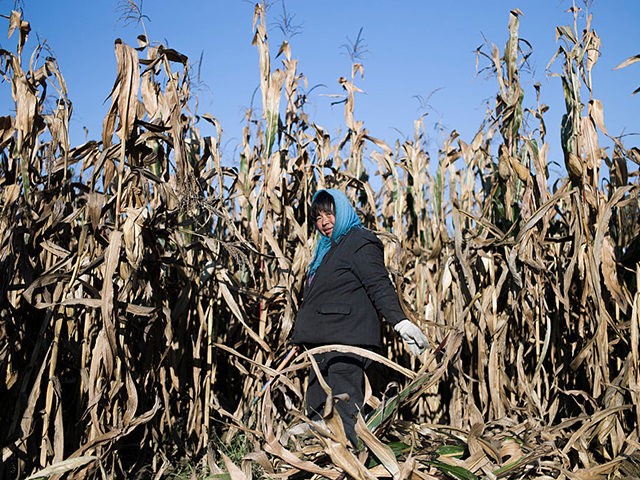More evidence of a looming food crisis in China emerged from the agricultural province of Jilin on Tuesday, as farmers said coronavirus lockdowns have prevented them from planting corn.
The South China Morning Post (SCMP) quoted Jilin farmers who said their fields have been neglected for so long that planting in time for the next harvest has become “impossible.”
“Now no one is allowed to go out, and the agricultural stores have no seeds and fertilizers. Even if they have, farmers can’t go out to buy,” one farmer complained.
Analysts noted road traffic to Jilin is down by almost 87 percent versus last year, which suggests the necessary equipment and supplies might not be on hand when planting season begins in late April. The province normally supplies about 10 percent of China’s corn.
The SCMP noted Chinese officials are acknowledging the problem but insist there is still time to save the season:
Chinese Vice-Premier Hu Chunhua said on Friday demand for corn outstripped supply in China at the moment and the country must work together to boost output above last year.
Rural pandemic prevention needs to be coordinated with agricultural production to ensure that crops are planted without delay and spring ploughing is completed, Hu said.
Authorities in Jilin issued a statement on Monday saying farmers locked down in urban areas can return to their hometowns to work from Tuesday, provided they meet certain conditions, including a negative coronavirus test and no close contact with anyone infected.
The Chinese Communist Party spent the past year touting “food security” and independence as top goals, with record domestic corn production booked last year. However, thanks to coronavirus lockdowns and market disruptions caused by the Russian invasion of Ukraine, China is now importing more corn than ever, including American corn. Industry analysts believe China’s recent huge purchases of agricultural products could be a tacit acknowledgment of a domestic food crisis to come.
In addition to lockdowns physically preventing farmers from preparing for the vital spring planting season, China joins the rest of the world in bracing itself for a shortage of fertilizer chemicals due to the war in Ukraine. China obtains roughly half of its potassium from Russia and Belarus.
“This will definitely have some impact. If the trade of fertilizers and grain is interrupted, how can we do spring fieldwork? How can we hold the rice bowls of our 1.4 billion population in our own hands? There will be a lot of trouble,” Chinese economic policy director Xu Hongcai said in March when fertilizer exports from Russia and Ukraine began slowing down or halting entirely.
The Financial Times on Wednesday cited official data that said, “as many as a third of farmers in northeastern Jilin, Liaoning and Heilongjiang provinces have insufficient agricultural inputs after authorities sealed off villages to fight the pandemic.”
The lockdowns in these three provinces could put up to 20 percent of China’s grain production at risk. A government adviser in Beijing admitted China could be “facing food shortages” in the year to come.
“We have to adjust the zero-Covid policy for farming. We shouldn’t prioritize virus control over everything else. This can’t carry on forever,” the adviser told the Financial Times.
In addition to supply shortages, farmers noted that lockdowns are preventing migrant workers from traveling to farm country in time for planting season. Drivers who could transport both supplies and workers say they are fearful of entering lockdown areas because they might not be allowed to leave.
Chinese officials might be gambling they have enough of an inventory to endure one fumbled planting season and subsequent poor harvest. China is notorious among agricultural experts for stockpiling gigantic amounts of food, which occasionally sparks complaints from other nations that Chinese hoarding creates worldwide shortages and drives prices up.

COMMENTS
Please let us know if you're having issues with commenting.